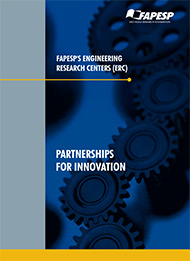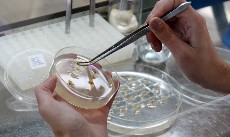Research Centre for Gas Innovation (RCGI)

Goal: To propel Brazil towards a sustainable future by reducing greenhouse gas emissions and fulfilling Brazil’s Nationally Determined Contribution (NDC) on climate change
Coordinator: Julio Romano Meneghini
Host Institution: Polytechnic School / University of São Paulo (Poli-USP)
Business partner: Shell Group
https://sites.usp.br/rcgi/br/home/
+55 11 5549-1863
+55 11 5081-5237
rcgi@usp.br
FAPESP Process 2020/15230-5
Phase 2
Term: May 2021 to Apr 2026
FAPESP Process 2014/50279-4
Phase 1
Term: Dec 2015 to nov 2023
The Research Centre for Greenhouse Gas Innovation (RCGI) was founded as a world center for advanced studies on the energy transition, sustainable use of natural gas, biogas and hydrogen, and the management, transport, storage and usage of CO2. Hosted at the University of São Paulo (USP), the center is the result of partnerships between FAPESP and private companies.
With a core focus on reducing greenhouse gas emissions and fulfilling Brazil's nationally Determined Contribution (nDC) for climate change, the RCGI has emerged as a leader in advanced energy transition studies.
It has a team of 530 researchers representing a wide array of fields of science and technology. Its mission has three pillars: research, innovation, and the dissemination of knowledge.
Since 2015, the RCGI has conducted 46 projects spanning five comprehensive research programs: Engineering, Physical Chemistry, Energy Policies & Economics, CO 2 Abatement, and Geophysics. In a new phase beginning in 2021, it introduced five innovative programs: Nature-Based Solutions (NBS), Carbon Capture and Utilization (CCU), Bioenergy Carbon Capture and Storage (BECCS), Greenhouse Gas (GhG), and Advocacy.
In 2023, two more programs were added: Innovation Power Systems and Decarbonization. It has also forged crucial collaborations with top-tier institutions in the USA through the Center to Center (C2C) initiative generously funded by FAPESP and NSF.
RCGI's ambition is to evolve into a world-renowned hub for advanced studies, focused on innovation and sustainability while actively mitigating greenhouse gas emissions, and to provide global solutions to climate change, the defining challenge of the 21st century.
Through the seamless integration of its seven core programs and the dynamic collaborations facilitated by C2C, RCGI has harnessed a wealth of knowledge and innovation from its research endeavors. These resources directly empower Brazil to achieve its nDCs, solidifying its position as a global renewable energy leader. RCGI stands as an example, ready to unleash Brazil's potential in navigating a sustainable energy transition that aims to keep the average global temperature rise below 2° C.
A testament to RCGI's commitment to pioneering solutions is the world's first plant to produce renewable hydrogen from ethanol. This pilot facility is scheduled to become operational in July 2024, with a yield of 4.5 kg of hydrogen per hour. Should this pioneering endeavor prove successful, it will pave the way for even greater strides in collaboration with industry partners.
In conclusion, RCGI's unwavering dedication to sustainability, innovation, and climate action puts it at the forefront of efforts to address the pressing challenges of our time. As it continues to push boundaries and forge global partnerships, it serves as an example of hope for a more sustainable and resilient future.
RESEARCH AREAS
1. Nature-Based Solutions (NBS)
2. Carbon Capture and Utilization (CCU)
3. Bioenergy Carbon Capture and Storage (BECCS)
4. Greenhouse Gas (GhG)
5. Advocacy
6. Innovation Power Systems
7. Decarbonization
RESEARCH HIGHLIGHTS
World’s first hydrogen-from-ethanol plant will be built at University of São Paulo
The project is the result of a partnership between FAPESP and Shell, and could help make hydrogen a widely used fuel in Brazil. hydrogen from a pilot plant to be built at USP using Raízen’s ethanol will power buses on the campus.
Deforestation in Indigenous Territories caused emission of 90 million metric tons of CO2
Scientists analyzed data for the period from 232 Indigenous Territories in Brazil. Results published in Scientific Reports shows deforestation rates accelerating between 2019 and 2021.
Studies on carbon storage supported by FAPESP contributed to legislative proposal
Results of studies conducted at the Research Center for Greenhouse Gas Innovation (RCGI) have fed into a bill before the Senate to set up a legal framework on carbon capture and storage as an economic activity.
BV-FAPESP:
https://bv.fapesp.br/en/auxilios/108357/ (phase 2)
https://bv.fapesp.br/en/auxilios/90424/ (phase 1)



